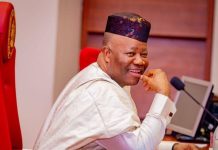Africa-Press – Nigeria. Southern African Development Community Parliamentary Forum (Sadc PF) secretary general, Boemo Sekgoma, has urged parliamentarians and researchers to strengthen monitoring and evaluation (M&E) systems to capture and demonstrate the tangible impact of sexual and reproductive health and rights (SRHR) interventions across the region.
Officially opening the monitoring and evaluation capacity development Workshop in Johannesburg, organised under the Sadc PF’s SRHR HIV and Aids and Governance Programme supported by Sweden, Sekgoma said the forum was entering a “defining point” in its journey to deliver universal access to integrated SRHR and HIV and Aids services, promote gender-responsive climate action and entrench democratic accountability.
“This workshop is far more than a routine event on our calendars; it represents a unique confluence of expertise, vision and shared purpose,” she said.
“Our convergence is an expression of solidarity and determination, as we seek not merely to increase our technical skills but to reaffirm our common ambition: the pursuit of transformational impact rooted in rigor, innovation, and inclusivity.”
Sekgoma reminded participants that results-based management (RBM) must guide the Sadc PF’s interventions and reporting processes.
“RBM is a management strategy by which all actors, contributing directly or indirectly to achieving a set of results, ensure that their processes, products and services contribute to the achievement of desired results,” she said.
“The actors in turn use information and evidence on actual results to inform decision-making on programme design, resourcing and delivery, as well as for accountability and reporting.”
She noted that Sweden’s continued support demanded rigorous reporting and evidence of impact.
“We owe it to our partners and the people of our region to ensure that every story, every indicator, and every piece of evidence reflects progress, accountability, and meaningful change,” she stressed.
The secretary-general urged participants to move beyond conventional numeric indicators and output-tracking, and instead embrace stories of transformation that capture the human impact of SRHR interventions.
“The development and documentation of ‘stories of significant change’ is not simply a reporting obligation.
“Rather, it is an essential strategic imperative,” she said.
“These narratives, rooted in the real-life experiences of individuals and communities, highlight the substance and significance of our programs. They make visible the progress that often goes unseen.”
She emphasised that such evidence that combines qualitative stories with quantitative results, would not only inspire donors and partners but also bolster the credibility and advocacy work of parliaments across the region.
As the participants prepared to embark on sessions covering advanced M&E methodologies, case study development, and data harmonisation, Sekgoma called for vigorous engagement and openness.
“Let us build and refine our capacities to document, analyse, and communicate outcome-level results with clarity and rigour,” she said.
“By adopting a harmonised and systematic approach to monitoring and evaluation, we will ensure that our work aligns with the strategic priorities of our partners, lays the groundwork for annual reporting, and prepares us adequately for forthcoming external evaluations.”
Sekgoma also reminded the participants that the real measure of success lies not only in outputs achieved but in stories of “hope, empowerment, resilience, and transformation” across Sadc communities.
“The journey towards universal SRHR and democratic accountability requires each of us to be diligent stewards of change, resilient champions of equity, and passionate narrators of progress,” she said. The two-day workshop brings together 22 research directors and senior researchers from 11 Sadc countries, with the aim of consolidating case studies, harmonising reporting templates, and equipping participants to contribute effectively to Sadc PF’s annual reports and the forthcoming external evaluation of the SRHR HIV and Aids Governance Programme.
For More News And Analysis About Nigeria Follow Africa-Press







